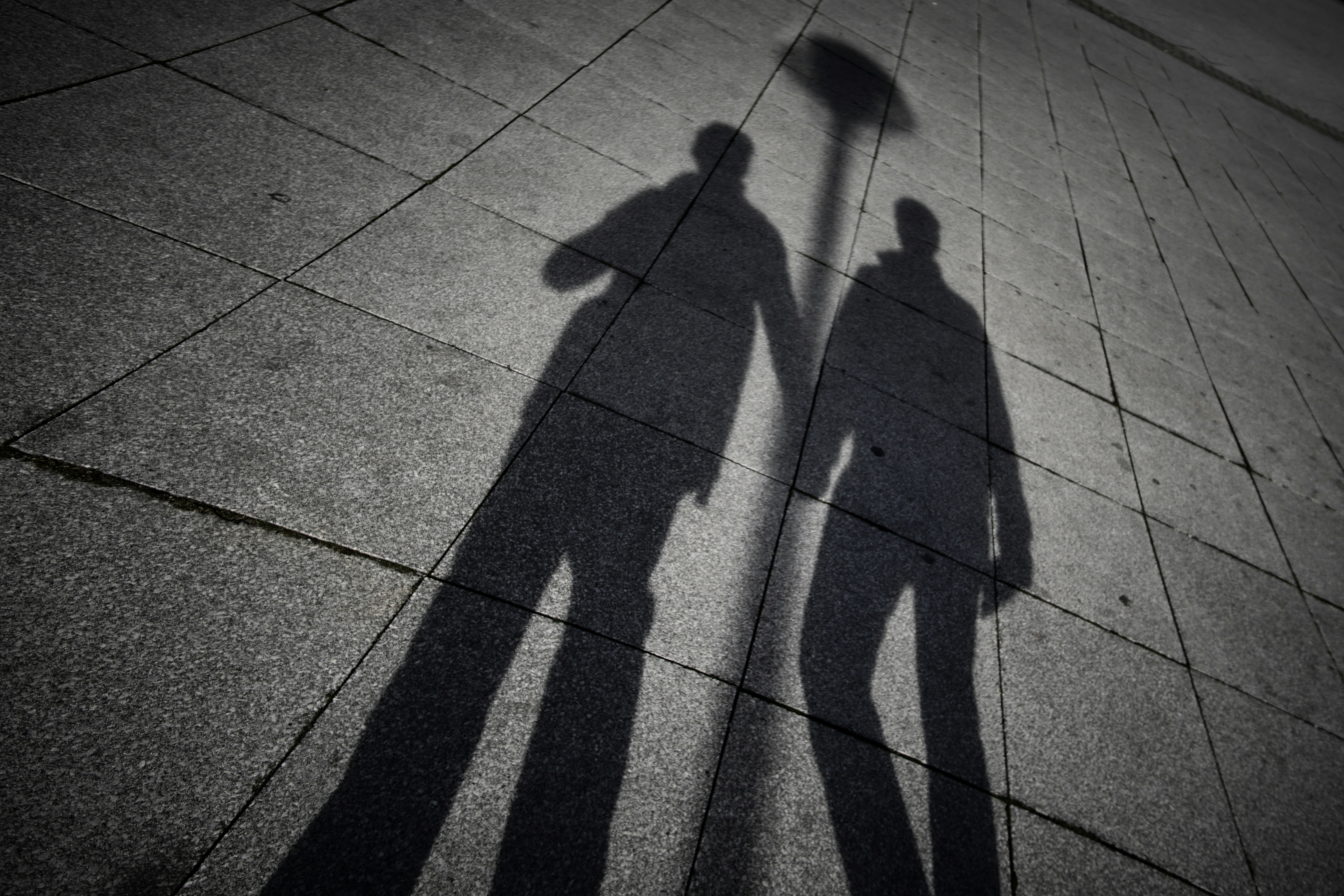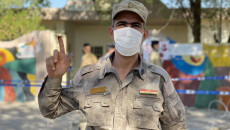“I feel lonely and frustrated. I am scared and constantly anxious,” said Shaida, who belongs to the LGBT community following the Iraqi Parliament’s approval of the law against prostitution and homosexuality, which includes prison sentences for LGBT community members.
“I think there is no way left for me to stay in this society. I cannot become a part of it,” according to Shaida (25 years old), who says that she is physically female but is bisexual.
Bisexuals in the LGBT community are a term given to people who have emotional and sexual orientations to both males and females, which is rejected by the majority of society, according to Shaida.
"I was always afraid that those around me would find out about me. We live in difficult conditions in this society and we are in constant anxiety and fear, and now this law has increased our suffering. We really do not know what to do," she added.
Baran is a nickname for a gay person - his features are masculine, but he feels like a girl. He says, “Yes, our circumstances have become complicated. There is no hope left to help members of the LGBT community.”
We live in difficult conditions in this society
On April 27, 2024, the Iraqi Parliament approved an amendment to Law No. 8 of 1988. The amendment imposes a set of severe penalties represented by imprisonment and a financial fine on those who practice prostitution or homosexuality, including a 15-year prison sentence.
“In the Iraq of the righteous prophets and imams, there is no place for homosexuals,” said the Deputy Speaker of the Iraqi Parliament, Mohsen Al-Mandalawi, after the amendment to the law was approved, and stressed the “importance” of the law to protect the value structure of Iraqi society.”
The parliament session was attended by 170 deputies out of a total of 329 deputies.
Zanu is a pseudonym for an activist defending the rights of LGBT people in Iraq. She identified herself as a “non-binary third gender.” She told KirkukNow, “How can a person be imprisoned just because he describes himself according to different sexual and gender definitions? Are these definitions a crime?"
“The amendment takes violence against the LGBT community to a higher level, and the institutions themselves will, by law, become part of this violence,” Zanu adds. “This law will give people and extremist groups an excuse to commit violence against us in broad daylight.”
Zanu is active on her Instagram page, spreading awareness about the LGBT community and defending their rights. She says that after the amendment was approved, “I changed my lifestyle and relationships and made them more restrictive... All members of the LGBT community must take caution.”
The draft amendment to the law against prostitution and homosexuality was presented to the Presidency of Parliament for the first time in July 2023 by independent MP Raed Hamdan Al-Maliki (Shiite), who is a member of the Parliamentary Legal Committee.
Although the first reading of the draft amendment to the law was held, on September 10, 2023, the amendment proposal was withdrawn by the former Speaker of Parliament, Muhammad al-Halbousi.
Withdrawing the draft amendment sparked protest from some parliamentary blocs, and a number of representatives registered a complaint against the Speaker of the Iraqi Parliament in the Federal Court.
On January 9, 2024, the Federal Court recognized the unconstitutionality of withdrawing the amendment proposal and it was returned again to Parliament and included on the agenda, to be approved.
A member of the Legal Committee who preferred to remain anonymous said, “We were in continuous deliberations for nine months, and the amendment proposal included a major tightening, because it included the death penalty.”
“After great efforts, we were able to delete the paragraph related to the death penalty, and we developed solutions in one of the paragraphs for people born with genetic defects related to sex," he added
“I see that approving the amendment was a political reaction towards the West... and not to protect society as its supporters claim.”
The member of the Legal Committee pointed out that “they wanted to say to the West: We are against all these matters that you care about within the framework of democracy.”
“We must also not forget that the issue of religion dominates Arab society, so we can think about a religious perspective to protect society."
The entry into force of the law awaits its publication in the Iraqi newspaper Al-Waqa’i.
Firmesk Jaff, a psychotherapist, says that the psychological effects of the law amendment on LGBT individuals are beginning to appear.
Jaff, who provides psychological advice and treatment to cases from the LGBT community, told KirkukNow, “I spoke with three members of the LGBT community, all of whom say that they feel fear, anxiety, and frustration. Their situations are getting more complicated day after day and they are being subjected to harassment and hostility.”

Laith, a 27-year-old homosexual Iraqi man living in Baghdad, told Human Rights Watch HRW in 2022 that he saw a group of gunmen kidnap his partner from his home and torture him to death. HRW
According to the amendment to the law, anyone who retains a person for prostitution or homosexuality in a place by deception, coercion, or threat, and the age of the victim is over 18 years, shall be punished with imprisonment for a period not exceeding 10 years. However, if the victim is under 18 years of age, he will be punished with imprisonment for a period not exceeding 10 years.
Under the amendment, anyone who has a homosexual relationship shall be punished with imprisonment for a period of no less than 10 years and no more than 15 years.
The amendment stated, “Anyone who promotes prostitution or homosexuality by any means shall be punished with imprisonment for a period of not less than seven years and a fine of not less than 10 million (Iraqi) dinars and not more than 15 million dinars (USD10,000),” with confiscation of the means used for the promotion.
Another paragraph in the amendment also stipulated that anyone who commits an intentional practice of effeminacy or promotes it will be punished with imprisonment for a period of not less than one year and not more than three years, or a fine of not less than 5 million dinars and not more than 10 million dinars.
Effeminacy is also a term used to refer to an intersex (transgender) person (the presence of male and female reproductive organs and characteristics in one person), but the law, according to specialists, refers to people who are found to be male but who “intentionally” engage in feminine behaviors (gay, homosexual).
Firmesk Jaff says that she asked her LGBT clients about the change that amending the law would make in their lives, and they answered that they had lost hope in life and survival within Iraqi society, so they were thinking about leaving Iraq.
“The issue of the LGBT community is one of the complex topics in Iraq and the Kurdistan Region. There is some confusion between the love of the experience and the reality of the situation,” she believes.
Leaving the country is not the solution
“For example, there are cases related to a 48-year-old man who says that he learned of his homosexual tendencies when he was 46 years old. This matter is not correct from a psychological standpoint, because this condition falls within the love of experimentation and he does not belong to the LGBT community,” she adds.
“People who belong to this community feel their tendencies since adolescence and determine their orientations later at a certain age.”
The LGBT people who spoke to KirkukNow all believe that the only solution is to leave Iraq to escape the current situation.
But Firmesk insists that leaving the country "is not the solution, because if they leave Iraq, it will not be easy for them to start a new life. Each one of them carries his own identity. It is not easy to create a new identity from the beginning."
According to the applicable laws, the amendment to the law enters into force immediately after its publication in the Iraqi Gazette, but its implementation in the Iraqi Kurdistan Region IKR requires ratification by the regional parliament, and this comes at a time when the regional parliament is no longer active and it is now unable to endorse laws.
Dr. Khamoush Omar, an expert in constitutional laws, told KirkukNow that “the amendment is not central, because it was not issued in accordance with Article 110 of the Iraqi Constitution. This article defines the powers of the center (Baghdad). Any law issued in the Iraqi parliament that does not fall within Article 110 cannot be implemented in provinces of the Kurdistan Region.”
“In this case, a legal outlet must be found, that is, referring the same legal procedures related to the draft law to the Kurdistan Parliament to vote on, and then the President of the Region signs it and publishes it in the Al-Waqa’i newspaper in order for it to enter into force. To achieve this, we must wait for the sixth session of the Kurdistan Regional Parliament.” According to Omar.
Amidst all this despair and frustration, Shaida says, "We don't want you to pity us. Just look at us as human beings and respect our feelings. That's enough."






